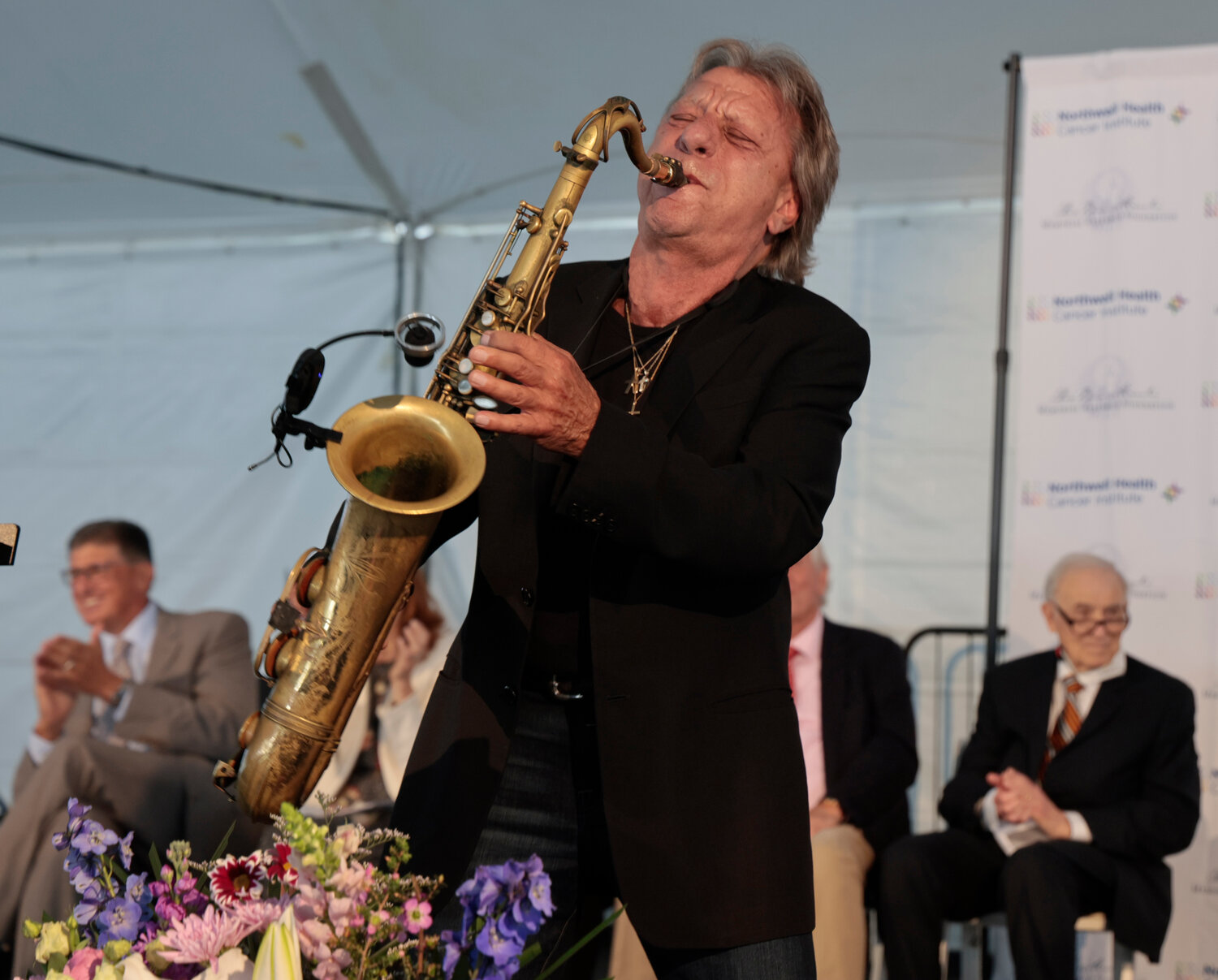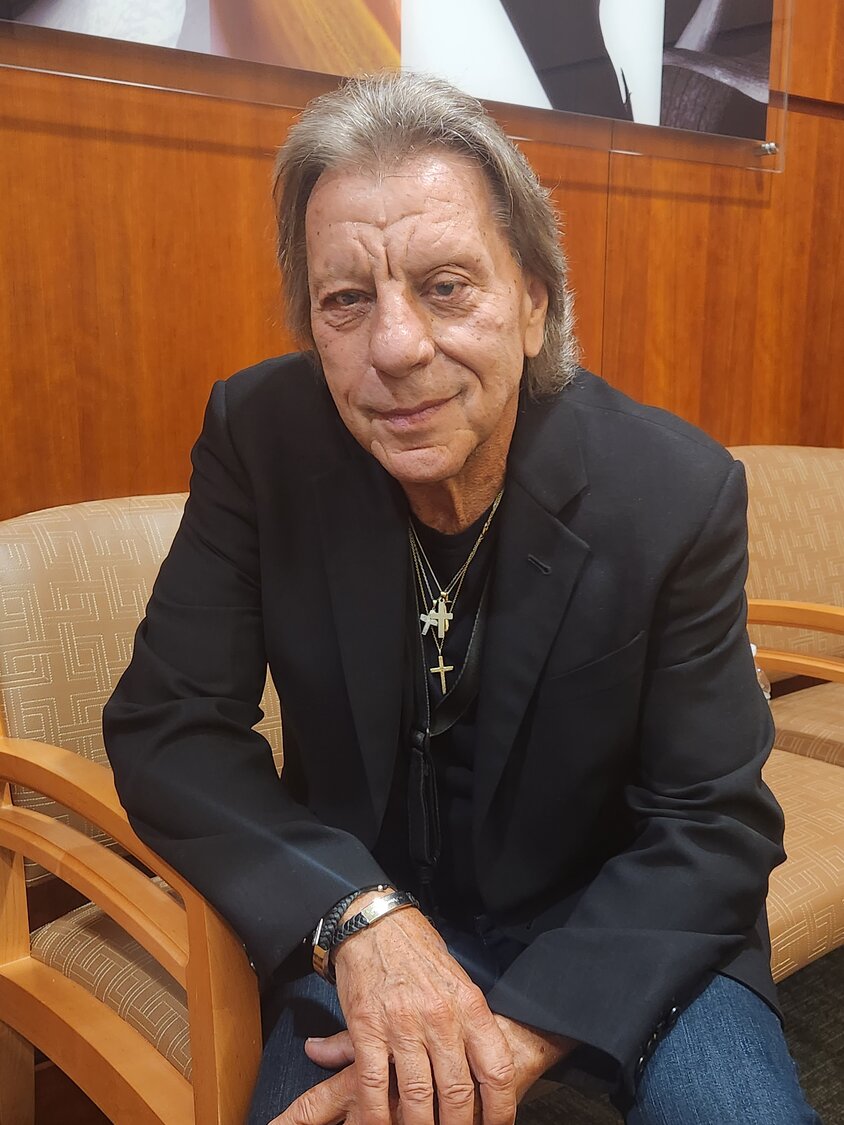Saturday, April 27, 2024
Celebrating a special day for cancer survivors
When Richie Cannata picked up his first instrument at age 4, music became a fundamental part of his life. He often jokes that he’s never had a job. Instead he has made a very good living thanks to his musical talents.
And he is a cancer survivor.
In 2015, the Grammy-winning artist, Billy Joel’s original saxophonist, lost his ability to snap his fingers, tear open a packet of sugar, or pick up his beloved saxophone without feeling excruciating pain.
Cannata was diagnosed with Stage 4 non-Hodgkin’s lymphoma, and spent
six months at North Shore University Hospital receiving continuous chemotherapy, six days a week. One evening, when fellow musician Julio Fernandez came to visit Cannata at his home in Glen Cove, Fernandez suggested Cannata play saxophone on his porch while Fernandez played guitar. Although Cannata was well enough to finally leave the hospital, he was dependent on either a wheelchair or walker as he rehabilitated the muscles in his hands.
As Cannata pushed his walker around his house, scouting for a saxophone, he found he wasn’t strong enough to undo the zipper on the instrument’s case. He wanted to give up, but then Cannata found another saxophone case he could open. And when he did, he found his soprano saxophone. As Fernandez played guitar, Cannata was able to hold the brass body of his saxophone which he thought he would never be able to do again. Then he blew air through his lips and played.
At that moment he realized if he could go that far, he could go further on his journey to recovery.
“I was testing the waters of mechanics just making a sound,” Cannata said. “I was like a young student for the first time putting a clarinet or saxophone to their mouth.”
Every cancer survivor has a story—one filled with fear, hope and courage. But while survivors have many things in common, no two journeys are the same.
Many cancer survivors like Cannata shared their stories with one another at Northwell Health’s annual Cancer Survivors Day on June 3. The event took place outside the Lake Success Medical Center where many survivors first received their life-changing diagnosis. More than 1,200 cancer survivors, their loved ones, and medical staff from various Northwell Health cancer centers gathered to show their support in the fight against the disease.
Cancer is the second-leading cause of death worldwide with about 10 million deaths per year. There are more than 200 types of cancer which can be classified according to where they start in the body, such as breast cancer or lung cancer.
Dr Matt Weiss, deputy physician-in-chief and director of the surgical oncology program at Northwell Cancer Institute, said he thinks it’s important for patients to see success stories like Cannata’s. He wants his patients to see that people have fought the disease and have lived their lives well.
Certain risk factors like smoking and heavy alcohol consumption are known to increase the likelihood of cancer. However, it can be difficult to pinpoint an exact cause. Although treatments have significantly improved in the last five years, there’s still more to learn about treatment and risk factors.
“Some of its environmental and some of its genetic,” Weiss said. “But my guess is that good old-fashioned bad luck is actually among environmental exposures and genetics that we just haven’t figured out yet. I personally believe that all cancer is genetic, on some level, and I think there are environmental factors that can lead to a diagnosis.”
Dr. Richard Barakat, physician-in-chief and director of the Northwell Health Cancer Institute, emphasized that Northwell focuses on genetic testing and precision medicine, but cancer doesn’t just occur in a vacuum. He stressed that many cancer patients have comorbidities like diabetes, high blood pressure, or obesity.
Barakat said health care professionals must understand all factors involved in a patient’s health outcome, such as socioeconomic status, whether they have food insecurity, whether they have difficulty getting transportation. He believes that personalizing health care to each patient’s individual needs, whether it involves transportation or addressing food insecurity, is an essential part of treatment.
“We have to bring all of these social factors together, including their race and ethnicity,” Barakat said. “That’s what personal medicine is all about. Because having a mutation in a certain type of tumor in one individual may not be the same as having that mutation and someone who has socioeconomic issues and other hardships that they have to deal with.”
Although Cannata said the road to recovery was difficult, he admitted that half the battle is paying attention to his body.
“It’s not a death sentence,” Cannata said. “It’s something that can be cured through Northwell hospital and places that can administer the anecdote. Pay attention and you’ll get better."
HELP SUPPORT LOCAL JOURNALISM
The worldwide pandemic has threatened many of the businesses you rely on every day, but don’t let it take away your source for local news. Now more than ever, we need your help to ensure nothing but the best in hyperlocal community journalism comes straight to you. Consider supporting the Herald with a small donation. It can be a one-time, or a monthly contribution, to help ensure we’re here through this crisis. To donate or for more information, click here.
Sponsored content
Other items that may interest you









